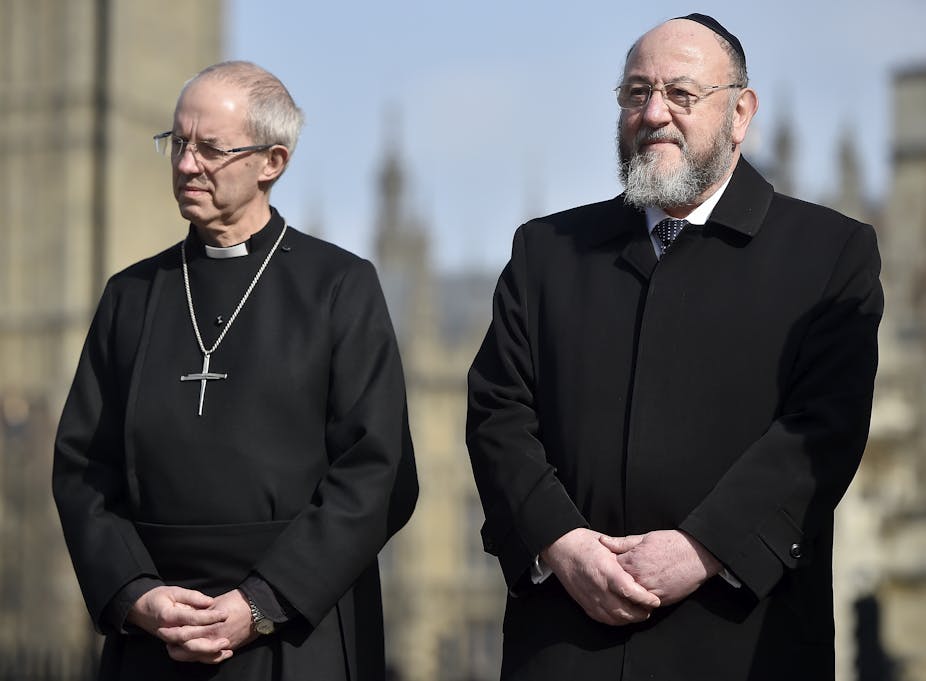The Church of England has confirmed plans to apologise to UK Jews for medieval antisemitic laws, put in place centuries before the church itself existed.
The anticipated apology is a curious one, especially as the modern British Jewish community has not been actively calling for it.
The measures in question, put in place by the Synod of Oxford in 1222 (a gathering of leading bishops and church leaders) and Archbishop Stephen Langton of Canterbury, were not the first against medieval Anglo-Jewry, but they did lead to increased pressure on this small (a few thousand) community.
The Oxford decrees forbade the Jews from building synagogues where they had not settled before, introduced badges so that the Jews could be differentiated and forbade sexual and many social relations between Jews and non-Jews. Jews were not to remain in England unless they could support themselves. While the implementation of these regulations was slow and uneven, it is not unreasonable to see them as paving the way for the expulsion of the Jews from England in 1290.
Alongside these measures, Jews were put under greater pressure to convert by the church in houses specially built for this purpose. This took place in a variety of towns as another way of solving an imaginary “Jewish problem” (in particular a fear that Jews were in league with the Devil and undermining Christianity by Judaising the nation). The numbers of these converted Jews increased during the 13th century as the persecution intensified. Indeed, some converted Jews were to remain in England after 1290, and the Domus Conversorum – “House of Converts” – remained until the 16th century.
What is odd about this apology is that the Anglican church would not come into existence until over three centuries after these decrees. What’s more, the synod was a “local” response to the Fourth Lateran Council in 1215, which provided papal guidelines for Jewish-Christian relations. In short, the dominant Protestant voice in the UK is now apologising for pre-Reformation Catholic initiatives.
Growing recognition
There are a few factors that may explain the nature and timing of this apology, but also why it fails to be wholly impactful. A more meaningful shift of Anglican theology, when it comes to Jewish relations, would be a rejection of all efforts to convert Jews to Christianity.
While the Church of England no longer actively seeks out Jews to convert (it spent a fortune without much reward doing so in the 19th century, continuing well into the 20th with its Church Mission to the Jews), it has not ruled out the theological principle of doing so.
The move to apologise for the medieval laws comes as part of a growing recognition within the Church of England that Christian anti-Judaism was a key, if not the only, cause of modern antisemitism.
This was recognised as early as the 1920s by the radical Anglican clergyman James Parkes, who spent his whole career fighting for the Jews – before, during and after the Nazi era. Confronting the scale of violent, racial antisemitism in the university campuses of Europe during the 1920s, Parkes carried out deep research into the roots of this animosity.
In his 1969 autobiography, Parkes wrote how he was “completely unprepared for the discovery that it was the … Christian Church alone, which turned a normal xenophobia and normal good and bad communal relations into the unique evil of anti-Semitism”.
God’s Unfailing Word, the 2019 Church of England document on Christian-Jewish relations, accepts the pivotal work of Parkes in acknowledging that troubling legacy. In that sense, the apology is an extension of the 2019 document.

The apology reflects the concern over contemporary antisemitism which, according to communal figures, has been rising in numbers and intensity across Europe, including the UK. It has ultimately become an issue of general concern within and beyond the Jewish world.
It is also part of the general reassessment of ideas and heritage following the murder of George Floyd and the work of the Black Lives Matter movement. The Church of England, since the summer of 2020, has been exploring potentially offensive physical heritage relating to Black people and, where necessary, removing it – such as gravestones in Rottingdean, East Sussex commemorating “blackface” entertainers.
Changing times
In the early 1990s, I organised a conference on Jewish heritage in the UK. It included a critical analysis of how the medieval heritage, both religious and secular, was still presented [in both religious and secular buildings and sites] by the Church. This included its dealing with the vicious anti-Jewish blood libel myth (that the Jews took young Christian children and ritually murdered them at Easter time, drinking their blood) as was the case in several cathedrals such as Lincoln and Winchester, or the failure to confront the horror of the 1190 massacre at York.
Since then, there has been much progress at these sites, including the Tower of London, where many Jews were imprisoned and hanged for trumped-up offences. In Winchester, the Jewish presence will be celebrated in the form of a statue to the remarkable businesswoman, Licoricia, recognising also the persecution this important community faced before the expulsion.
In that sense, the apology from the Church of England is most welcome. But there is something missing. James Parkes fought to make the world “safe to be a Jew” – not just in the physical sphere, but also religiously and culturally. Parkes fought against any attempt of Christians to convert the Jews.
God’s Unfailing Word, as Chief Rabbi Ephraim Mirvis politely but firmly notes in its afterword, did not make that pledge. To honour one of its greatest figures, James Parkes, it is now crucial for the Church of England to condemn the conversionism that blights its past.

